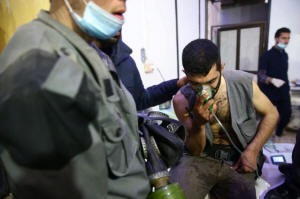|
Air strike kills Syrian family of nine in
rebel-held Ghouta: monitor
 Send a link to a friend
Send a link to a friend
 [February 26, 2018]
By Tom Perry [February 26, 2018]
By Tom Perry
BEIRUT (Reuters) - A family of nine was
killed in Syrian government bombardment of the rebel enclave of eastern
Ghouta overnight, where air strikes and fighting have persisted despite
a U.N. Security Council resolution demanding a ceasefire, a war monitor
said on Monday.
Health authorities in opposition-run eastern Ghouta said late on Sunday
that several people had suffered symptoms consistent with chlorine gas
exposure, killing one child, after an explosion.
"Eastern Ghouta cannot wait, it is high time to stop this hell on
earth," U.N. Secretary-General Antonio Guterres told the U.N. Human
Rights Council in Geneva, calling for implementation of the 30-day
ceasefire sought by the Security Council.
Syrian President Bashar al-Assad, backed by Russia and Iran, has
steadily clawed back control of areas where his opponents rose up
against his rule in 2011. Eastern Ghouta is the last major insurgent
stronghold near Damascus, the seat of his power.

The bombardment of eastern Ghouta over the past week has been one of the
heaviest of Syria's seven-year war, killing at least 522 people in seven
days, according to a toll compiled by the Syrian Observatory for Human
Rights, a UK-based war monitor.
It said two bodies had been pulled from the rubble of a home destroyed
by an air strike in the Ghouta town of Douma, with seven others from the
same family dead underneath.
The U.N. Security Council, including Russia, approved the resolution
demanding a 30-day truce on Saturday. The intensity of the bombardment
has diminished since then but has still killed two dozen people, the
Observatory said.
Rebel shelling has caused 36 deaths and a number of injuries in Damascus
and nearby rural areas in the last four days, Zaher Hajjo, a government
health official, told Reuters.
In eastern Ghouta, people were making use of the relative lull in the
bombardment to find provisions, said Moayad Hafi, a rescue worker based
there.
"There is less bombardment relative to recent days. Civilians rushed
from their shelters to get food and return quickly since the warplanes
are still in the sky and can hit at any moment," he told Reuters in a
voice message.
Iran's military chief of staff said on Sunday that pro-Damascus forces
would press ahead with the offensive in the Damascus suburbs, saying the
ceasefire did not cover parts of the Damascus suburbs "held by the
terrorists".

The main rebel factions in eastern Ghouta are Jaish al-Islam and Failaq
al-Rahman. Tahrir al-Sham, an alliance of jihadist groups including the
former al Qaeda affiliate Nusra Front, also has a presence there.
[to top of second column]
|

Men are seen in a hospital in the besieged town of Douma, Eastern
Ghouta, Damascus, Syria February 25, 2018. REUTERS/Bassam Khabieh

ACCUSATIONS OF CHEMICAL USE
Syrian state television reported that army units had directed
strikes and advanced against militants near Harasta in eastern
Ghouta. State news agency SANA also reported that the army had
stopped a car bomb being driven into Damascus.
The Nusra Front has consistently been excluded from ceasefires in
Syria, and the opposition says the government has used this as an
excuse to keep up its bombardments.
The Syrian government has consistently denied using chemical weapons
in the war, which will soon enter its eighth year having killed
hundreds of thousands of people and forced half of Syria's pre-war
population from their homes.
Russia, which backs the Assad government, accused rebels of
preparing to use toxic agents in eastern Ghouta so they could later
accuse Damascus of employing chemical weapons.
In recent weeks, the United States has accused Syria of repeatedly
using chlorine gas as a weapon. Rebel-held areas of the Ghouta
region were hit in a major chemical attack in 2013.
Last year, a joint inquiry by the United Nations and the
Organization for the Prohibition of Chemical Weapons (OPCW) found
the Syrian government was responsible for an April 4, 2017, attack
using the banned nerve agent sarin in the opposition-held town of
Khan Sheikhoun, killing dozens.

The inquiry had previously found that Syrian government forces were
responsible for three chlorine gas attacks in 2014 and 2015 and that
Islamic State militants had used mustard gas.
Elsewhere in Syria an air strike by the U.S.-led coalition fighting
Islamic State killed 25 people - more than half of them women and
children - in the militant group's last enclave on the Euphrates
River in Syria, the Observatory said on Monday.
A coalition spokesman said it would make a civilian casualty
assessment.
(Additional reporting by Angus McDowall and Dahlia Nehme in Beirut
and Stephanie Nebehay in Geneva; Editing by Gareth Jones)
[© 2018 Thomson Reuters. All rights
reserved.]
Copyright 2018 Reuters. All rights reserved. This material may not be published,
broadcast, rewritten or redistributed.
Thompson Reuters is solely responsible for this content. |